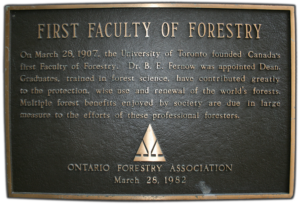 The Faculty of Forestry at the University of Toronto was the oldest forestry school in Canada and the second oldest in the Western Hemisphere. It was founded in 1907 by Bernhard E. Fernow, former head of the United States federal Division of Forestry, who is recognized as the father of scientific forest management in North America. The decision to set up the Faculty reflected widespread recognition of the importance of establishing forest management on a sound scientific basis, and it provided broad-based instruction in most areas of forestry.
The Faculty of Forestry at the University of Toronto was the oldest forestry school in Canada and the second oldest in the Western Hemisphere. It was founded in 1907 by Bernhard E. Fernow, former head of the United States federal Division of Forestry, who is recognized as the father of scientific forest management in North America. The decision to set up the Faculty reflected widespread recognition of the importance of establishing forest management on a sound scientific basis, and it provided broad-based instruction in most areas of forestry.
Up until the Second World War, the Faculty focused almost entirely on undergraduate education, though some MScF instruction in forest engineering started during the 1920’s. Graduate instruction expanded during the 1960’s in response to societal development and changing demands in the forest sector, and a PhD program was later established in 1972.
In 1989, the Faculty of Forestry moved into the University’s newly constructed Earth Sciences Centre, a shared divisional complex providing much needed laboratory space and technical services. We still reside here today.
In addition to the existing MScF and PhD programs, a new Master of Forest Conservation degree was introduced in September 1996, a program with no parallel in other Canadian universities. The MFC program was established in direct response to the world-wide shortage of suitably trained forest managers to meet the challenge of sustainable forestry and is one of the first anywhere to identify the opportunity to develop a leading professional educational program in forestry. This flagship program helps our graduates develop unique knowledge and competencies for conserving the world’s forests, enriching students’ in-class and in-field experiences with insights on public interests in forests and the integration of forest conservation, forest economics, human health, and the livelihood of First Nations and Aboriginal peoples.
Completely new undergraduate programs in Forest Conservation Science (BSc) and Forest Conservation (BA) were established in collaboration with the Faculty of Arts and Science in 2002, providing a broad combination of social and natural sciences in an innovative, career-focused preparation for forest stewardship.
We also continue to grow and develop our urban forestry legacy. It was Faculty member Dr. Eric Jorgensen who first introduced and defined the “urban forest” in the 1960’s. Our research on invasive species control contributes to better understanding of the ecosystem services and values represented by all forests, particularly the urban forest, and we help municipalities bring scientific understanding to their problem solving.
The Faculty’s research in forest ecology and restoration has furthered understanding of biodiversity conservation, forest productivity and mitigation and adaptation in the light of negative effects of forest stressors such as climate change. Forest sustainability is the integrating theme of our teaching and research. We predict a future in which decision-making about the emerging bio-economy will need to be informed by more research associated with forest sustainability. Additional research areas in which the Faculty excels include forest economics, forest management planning, forest and wildland fire management, and wildlife ecology.
During the 2000’s, the Faculty pioneered research in nano-biotechnology, bio-composites, and bio-nanocomposites. Through the conversion of forest waste products into bio-based green chemicals and bio-nanomaterials including plastics, lightweight composites, carbon fibre and foams, we explore more sustainable practices and increase forest sector efficiencies.
In 2019, the Faculty of Forestry joined the John H. Daniels Faculty of Architecture, Landscape, and Design. The merger of Canada’s first two professional schools in Forestry and Architecture at the University of Toronto was created to provide an innovated approach to sustainability, pave a road for more collaboration and interdisciplinary research, and produce more opportunities for students. It is the first time in North America that the broad scope of forest science is being seen as a necessary underpinning to building and landscape design.
Today the Institute of Forestry & Conservation continues to provide leadership in new and emerging areas of education and research with an emphasis on urgent global issues. Having successfully transformed the traditional model of forestry education, we embrace the future with a unique and innovative versatile approach in which there is social, ecological and bio-economic convergence to address wide-ranging challenges our forests face today.